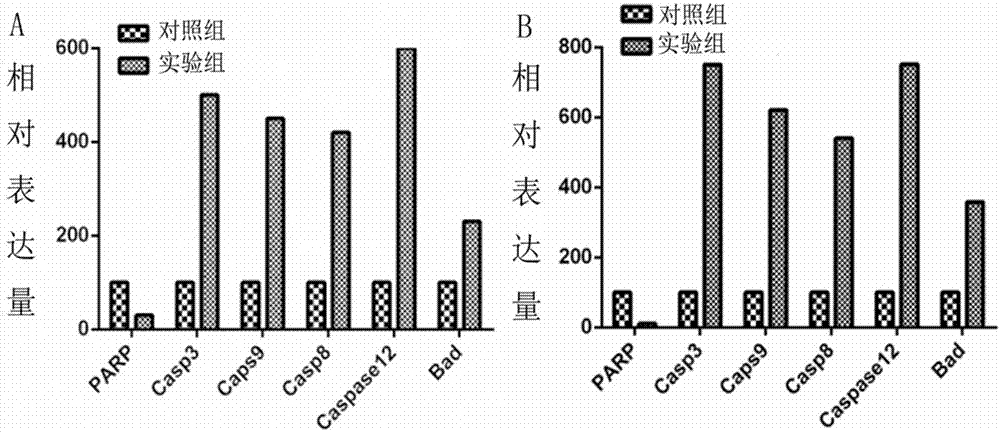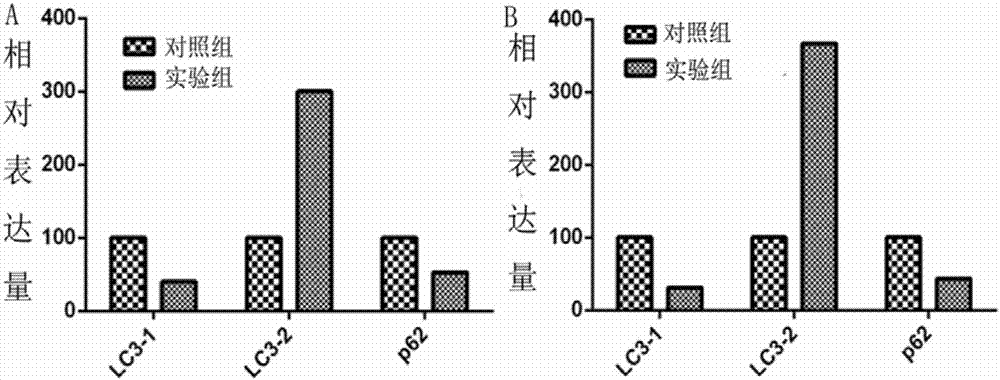Microarray chip for detecting protein expression in cell stress reaction and its preparation method, kit and detection method
A microarray chip and stress response technology, applied in biological testing, material inspection products, instruments, etc., can solve the problems of different affinity of antibody antigen reaction, affect the accuracy of test results, improper sample dilution, etc., and achieve rapid screening and evaluation , low sample volume, and simple preparation method
- Summary
- Abstract
- Description
- Claims
- Application Information
AI Technical Summary
Problems solved by technology
Method used
Image
Examples
Embodiment 1
[0049] Example 1. Preparation method of microarray chip for detecting protein expression in cell stress response
[0050] (1) Preparation of aldehyde-modified glass slides
[0051] Heat 800mL of deionized water to 95°C, add about 5g of washing powder, soak the new slide in washing powder water for 3h; take out the slide, soak in 1mM KOH deionized water solution for 1h; take out the slide, wash with deionized water Wash 3 times, 5min each time, and dry to obtain cleaned slides;
[0052] Soak the cleaned slides in an ethanol solution containing 5% aminomethoxysilane (V / V) for 30 minutes; take out the slides and wash them with acetone for 3 times, each time for 5 minutes; then wash them with deionized water for 3 times each time After 5 minutes, blow dry with nitrogen to obtain aminated glass slides;
[0053] Soak the amination-modified slide in PBS solution containing 2.5% glutaraldehyde (V / V) for 1 h; take out the slide, wash with PBS 3 times, 5 min each time; then wash 3 tim...
Embodiment 2
[0071] Example 2, Preparation of a kit for detecting protein expression in cell stress response
[0072] A kit for detecting protein expression in cell stress response, comprising the following components: (1) microarray chip for detecting protein expression in cell stress response, (2) cell lysate, (3) tissue lysate, ( 4) diluent, (5) washing solution, (6) enzyme-labeled secondary antibody, (7) luminescent substrate; the selection and function of each component are as follows:
[0073] (1) Microarray chip for detecting protein expression in cell stress response: preferably the microarray chip of Example 1;
[0074] (2) Cell lysate: containing Loading buffer, protease inhibitors, purchased from Beijing Beyond Biotechnology Co., Ltd.;
[0075] (3) Tissue lysate, containing Loading buffer and pmsf, purchased from Beijing Biyuntian Biotechnology Co., Ltd.;
[0076] (4) Diluent: it is a protein stabilizer, and the present embodiment is a 5% BSA solution; the effect is to dilute ...
Embodiment 3
[0081] Example 3, Detection method of protein expression in cell stress response
[0082] A method for detecting protein expression in cell stress response, comprising the steps of:
[0083] (1) Use tissue lysate and / or cell lysate to lyse the sample to obtain a protein lysate, and dilute it with a diluent to an appropriate detection concentration;
[0084] (2) Add 100 μL of diluted protein lysate to each well of the microarray chip, incubate at room temperature for 4 hours, remove unreacted protein lysate samples, wash 5 times with washing solution and PBS solution, and shake dry;
[0085] (3) Add 100 μL, 1000-fold diluted horseradish peroxidase-labeled goat anti-human IgG to each well of the microarray chip, incubate at room temperature for 4 hours, remove unreacted enzyme-labeled secondary antibody solution, wash with washing solution and PBS respectively Wash 5 times and shake dry;
[0086] (4) Add 100 μL of 1000-fold diluted fluorescein 555 to each well of the microarra...
PUM
 Login to View More
Login to View More Abstract
Description
Claims
Application Information
 Login to View More
Login to View More - R&D
- Intellectual Property
- Life Sciences
- Materials
- Tech Scout
- Unparalleled Data Quality
- Higher Quality Content
- 60% Fewer Hallucinations
Browse by: Latest US Patents, China's latest patents, Technical Efficacy Thesaurus, Application Domain, Technology Topic, Popular Technical Reports.
© 2025 PatSnap. All rights reserved.Legal|Privacy policy|Modern Slavery Act Transparency Statement|Sitemap|About US| Contact US: help@patsnap.com


